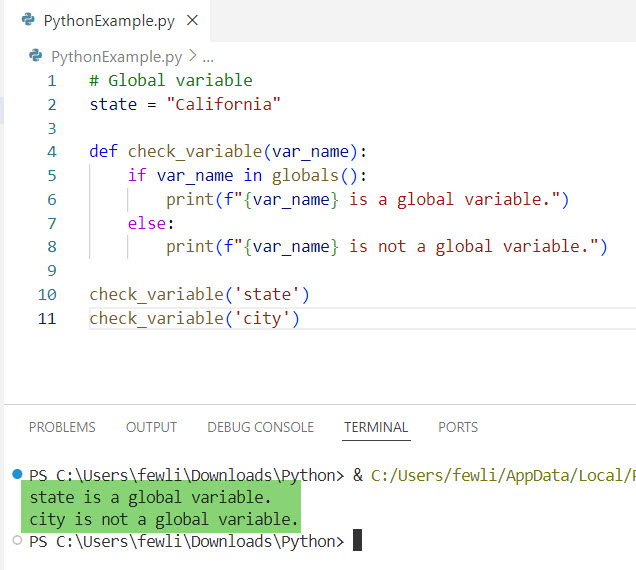Variables can be local or global, but as a Python developer, you should know the scope of the variable before using it. In this tutorial, I will explain how to check if a variable is global in Python with examples and complete code.
To check if a variable is global in Python, you can use the globals() function. This function returns a dictionary of the current global symbol table, which includes all global variables. Simply check if the variable name exists in this dictionary. For example, if 'variable_name' in globals(): will return True if variable_name is a global variable, and False otherwise.
What is a Global Variable in Python?
A global variable is one that is defined outside of any function and is accessible throughout the entire program. In contrast, a local variable is defined within a function and is only accessible within that function.
Here’s a simple example to see the difference:
# Global variable
city = "New York"
def print_city():
# Local variable
city = "San Francisco"
print("Local city:", city)
print_city()
print("Global city:", city)Output:
Local city: San Francisco
Global city: New YorkIn this example, city is a global variable when accessed outside the function and a local variable when accessed inside the function.
If you are new, then check out Local and Global Variables in Python and How to Make a Variable Global in Python?
Check if a Variable is Global in Python
To check if a variable is global, you can use the globals() function. This function returns a dictionary representing the current global symbol table, which includes all global variables.
Here’s how you can use globals() to check if a variable is global:
# Global variable
state = "California"
def check_variable(var_name):
if var_name in globals():
print(f"{var_name} is a global variable.")
else:
print(f"{var_name} is not a global variable.")
check_variable('state')
check_variable('city')Output:
state is a global variable.
city is not a global variable.In this example, state is a global variable, and city is not defined globally, so the function correctly identifies their scopes.
I executed the above Python code using VS code, and you can see the output in the screenshot below:

Using the global Keyword
The global keyword in Python is used to declare that a variable inside a function is global. This is useful when you need to modify a global variable inside a function.
Here’s an example:
# Global variable
country = "USA"
def change_country():
global country
country = "Canada"
print("Before change:", country)
change_country()
print("After change:", country)Output:
Before change: USA
After change: CanadaIn this example, using the global keyword allows the change_country function to modify the global variable country.
Conclusion
In this tutorial, I have explained how to check if a variable is global in Python. By using the globals() function and the global keyword, you can easily check if a variable is global in Python. If these examples help you, leave a comment below.
You may like the following tutorials:
- How to Check Variable Type is datetime in Python?
- How to Check if a Variable is a Number in Python?
- How to Check if a Global Variable is Initialized in Python?
- How to Check if a Global Variable is Defined in Python?

I’m Michelle Gallagher, a Senior Python Developer at Lumenalta based in New York, United States. I have over nine years of experience in the field of Python development, machine learning, and artificial intelligence. My expertise lies in Python and its extensive ecosystem of libraries and frameworks. Throughout my career, I’ve had the pleasure of working on a variety of projects that have leveraged my skills in Python and machine learning. Read more…